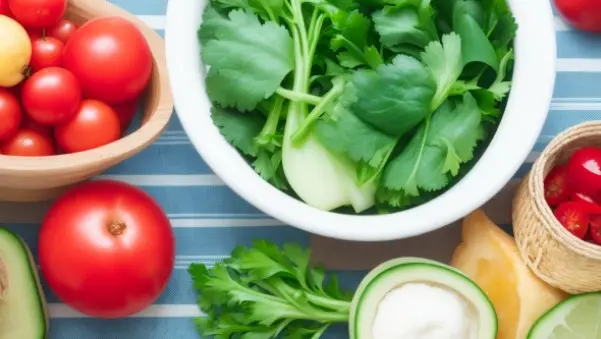When you step into the realm of culinary artistry, one principle stands as a cornerstone: the use of fresh ingredients. It’s a notion that resonates with professional chefs and home cooks alike, and it’s not just a culinary preference but a fundamental aspect of creating exceptional dishes.
Why you need to use fresh ingredients in your recipe?
Using fresh ingredients in your recipes is not merely a culinary preference; it’s a practice that offers numerous compelling reasons why it should be a fundamental part of your cooking routine. Here are some key reasons why you need to use fresh ingredients in your recipes:
- Better Flavor: Fresh ingredients offer richer, more natural flavors and aromas.
- Nutritional Value: They retain more vitamins, minerals, and antioxidants.
- Improved Texture: Fresh ingredients often have better texture and quality.
- Health Benefits: They contain fewer additives and preservatives, promoting better health.
- Sustainability: Supporting local, fresh produce reduces environmental impact.
- Community Support: Buying fresh ingredients supports local farmers and businesses.
- Culinary Creativity: Fresh ingredients inspire creativity in the kitchen.
- Seasonal Variety: Cooking with fresh, seasonal produce adds diversity to your meals.
- Food Safety: Fresh ingredients are less likely to be contaminated.
- Satisfaction: Cooking with fresh ingredients is a rewarding and enjoyable experience.
Definition of Fresh Ingredients
Fresh ingredients refer to those in their unprocessed, unaltered, and natural state. These are the vibrant vegetables, succulent fruits, aromatic herbs, tender meats, and delicate seafood that grace our kitchens. They are ingredients that have not been subjected to extensive preservation methods, additives, or excessive transportation.

The Role of Fresh Ingredients in Cooking
Fresh ingredients serve as the canvas upon which the art of cooking is painted. They are the raw materials that chefs and home cooks alike use to craft delicious and nutritious dishes. Freshness brings out the best in flavors, textures, and aromas, making each bite a sensory delight. From the crisp snap of a freshly picked vegetable to the intense sweetness of a ripe fruit, the role of freshness is undeniable in elevating the culinary experience.
Health Benefits of Using Fresh Ingredients
When it comes to cooking, using fresh ingredients can make a world of difference in terms of health benefits. Let’s dive into the various ways fresh ingredients contribute to your well-being.
Nutrient Retention
1. Vitamins and Minerals: Fresh ingredients are bursting with essential vitamins and minerals. When you opt for fresh produce, you’re getting the full spectrum of nutrients. Unlike their processed counterparts, fresh fruits and vegetables haven’t undergone nutrient-depleting preservation methods. These nutrients play a crucial role in maintaining everything from healthy skin to a robust immune system.
2. Antioxidants: Fresh ingredients are rich in antioxidants, which combat harmful free radicals in your body. These free radicals can cause oxidative stress and contribute to various diseases. By consuming fresh fruits, vegetables, and herbs, you provide your body with a natural defense system against these health threats.

Reduced Chemical Additives
Processed foods often contain a laundry list of additives – artificial colors, preservatives, and flavor enhancers. When you choose fresh ingredients, you’re eliminating these potentially harmful chemicals from your diet. Fresh food is clean food, free from the synthetic additives that can have adverse effects on your health over time.
Improved Digestibility
Fresh ingredients are easier on your digestive system. They contain natural enzymes and fiber that aid digestion. Processed foods, on the other hand, are often stripped of these digestive aids, leading to potential digestive discomfort.
Incorporating fresh ingredients into your meals not only enhances the flavor but also boosts your overall health by ensuring you receive the maximum nutritional benefits without the drawbacks of chemical additives.
[adinserter block=”1″]
How fresh Ingredients improves the taste of your food?
Cooking with fresh ingredients is a culinary secret that can elevate your dishes to a whole new level. Here’s how the use of fresh ingredients enhances the taste of your food:
Natural Flavors
1. Intensity and Authenticity: Fresh ingredients, such as herbs, spices, and produce, boast a natural intensity and authenticity of flavor that can’t be replicated by their processed counterparts. When you bite into a ripe, fresh tomato, you experience its full, sun-kissed flavor in all its glory.
2. Complexity: Fresh ingredients add complexity to your dishes. Their nuanced flavors create layers of taste that awaken your palate. For example, fresh herbs like basil or cilantro infuse dishes with a vibrant, herbaceous dimension that dried herbs simply can’t match.
Aromatics and Fragrance
1. Aromatic Oils: Fresh herbs and spices release aromatic oils when chopped or crushed, releasing a burst of fragrance that tantalizes your senses. The aromatic oils in fresh ingredients, like garlic or ginger, infuse your dishes with enticing scents that invite anticipation.
2. Appetite Stimulation: The appealing aroma of cooking with fresh ingredients can actually stimulate your appetite. It’s no wonder that the scent of freshly baked bread or the aroma of sautéing onions can make your mouth water.
Taste Sensation
1. Balance and Harmony: Fresh ingredients provide balance and harmony to your recipes. They allow you to control the taste profile precisely, ensuring that sweet, salty, sour, and savory flavors complement each other seamlessly. This balance is key to creating a memorable dining experience.
2. Customization: Fresh ingredients empower you to customize your dishes to your taste preferences. You can adjust the level of spiciness, tartness, or richness to create a meal that suits your individual palate.
In essence, using fresh ingredients in your cooking amplifies the taste of your food by harnessing the inherent vibrancy, complexity, and authenticity of natural flavors. The result? Meals that not only satisfy your hunger but also delight your taste buds and leave a lasting impression on anyone fortunate enough to enjoy them.
What are the benefits of fresh cooking?
Fresh cooking, which involves preparing meals using primarily fresh ingredients rather than heavily processed or packaged ones, offers numerous benefits that span health, taste, and environmental aspects. Here are some of the key advantages:

1. Nutritional Value: Fresh cooking allows you to retain the maximum nutritional value of ingredients. Fresh fruits, vegetables, lean proteins, and whole grains are rich in essential vitamins, minerals, and antioxidants. By using these ingredients, you ensure that your meals are packed with nutrients that promote good health.
2. Better Flavor: Fresh ingredients are known for their vibrant, authentic flavors. Cooking with fresh produce, herbs, and spices enhances the taste of your dishes, creating a more satisfying and enjoyable dining experience.
3. Reduced Chemicals: Fresh cooking minimizes the consumption of artificial additives, preservatives, and other chemicals commonly found in processed foods. This can lead to a healthier diet and reduce the risk of potential health issues associated with these additives.
4. Lower Sodium Content: When you cook from scratch, you have more control over the amount of salt you use in your recipes. This can help reduce sodium intake, which is important for managing blood pressure and overall heart health.
5. Environmental Sustainability: Fresh cooking often involves using locally sourced, seasonal ingredients. This supports local farmers and reduces the carbon footprint associated with long-distance transportation of food. It also encourages a more sustainable and environmentally friendly food system.
6. Food Safety: When you prepare meals from fresh ingredients, you have greater control over food safety practices. This reduces the risk of foodborne illnesses that can result from consuming undercooked or contaminated foods.
7. Customization: Fresh cooking allows you to tailor your meals to your personal preferences and dietary restrictions. You can easily adjust portion sizes, ingredients, and cooking methods to accommodate specific dietary needs.
8. Culinary Creativity: Cooking with fresh ingredients encourages creativity in the kitchen. You can experiment with different flavors, textures, and cooking techniques, leading to a greater variety of meals and a more enjoyable cooking experience.
9. Cost-Effective: While some may argue that fresh ingredients are more expensive, cooking from scratch can actually be cost-effective in the long run. You can make larger batches, save leftovers, and reduce food waste, ultimately saving money.
10. Family Bonding: Cooking with fresh ingredients can be a fun and educational activity for families. It provides an opportunity to teach children about the importance of fresh food, nutrition, and cooking skills.
In summary, fresh cooking offers a wide range of benefits, from improved health and taste to reduced environmental impact and greater culinary flexibility. By incorporating fresh ingredients into your meals, you can enhance your overall well-being and enjoy delicious, wholesome food.
Thanks for reading, and we hope to see you again here soon for more culinary explorations. Be sure to follow The TR Recipe. Also follow us on Pinterest, Texas Roadhouse Recipe.

